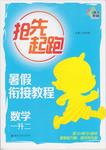题目内容
Someone is ringing the doorbell. Go and see _______.
A. who is he B. who it is C. who is it D. who he is
B

 数学奥赛暑假天天练南京大学出版社系列答案
数学奥赛暑假天天练南京大学出版社系列答案 南大教辅抢先起跑暑假衔接教程南京大学出版社系列答案
南大教辅抢先起跑暑假衔接教程南京大学出版社系列答案Children, especially at young ages, are very creative. And creativity can be a glorious thing. Look at all the amazing artists and architects that have created glorious pieces of history. Look at all the authors with the award winning books. Now I am not saying everyone is going to end up this way but creativity is an important part of growing up and becoming who you are. This should be encouraged in young children as well as the older children.
Young children grow up playing with make-believe. And so many people try to make their young child see that their invisible friend isn’t real or that talking when someone is not in the room is weird. To adults it is, but for small children it is them being creative. May it be them playing house, or chef, or playing with stuffed animals, it is their creative part coming out. Some kids can have fun playing with rocks and sticks and it’s because of their creativeness that they can do this. The invisible friend part is another part of being imaginative, and is not a bad thing since they will grow out of that phase. So encourage this and play along with them, play house or stuffed animals or whatever they want to play. Help keep their imagination running. You can even make up games, like treasure hunts, dinosaurs, or super heroes; there is just so much you can choose from.
For older children, talk to them. Help them see things through others’ eyes, or help them see things from a different point of view. Helping children see things from other views helps them keep their minds open for new ideas and new things.
All this can help your children’s minds stay creative. The arts and music, even thoughts are an important part of life and important in our society. If we didn’t have and encourage creative thinking, we wouldn't have had inventors, or philosophers, or as I said before, artists.
【小题1】The underlined word “weird” is the closest in meaning to “_______”.
| A.similar | B.strange | C.common | D.natural |
| A.the child is longing for friendship |
| B.the child has no one to play with in life |
| C.the child has great imagination |
| D.there is something wrong with the child’s mind |
| A.let him be |
| B.stop him from doing so |
| C.give him some advice |
| D.know that he is suffering from loneliness |
| A.How creative artists and architects can be. |
| B.How to help children grow up in a healthy way. |
| C.What kind of activities children like. |
| D.How to protect and encourage children’s creativity. |
Honesty,my mum always used to tell me,is the best policy.Of course,this didn’t include her when she told me that if I didn’t eat all my vegetables Father Christmas would find out and wouldn’t give me any presents.
But when it comes to medicine.I had assumed it was important to always be honest with my patients.After all,the doctor-patient relationship is based on trust,and therefore honesty is essential.Or so I thought.
I had just started working in geriatrics(老年病科).Mr. McMahon was brought in when his belly was found very swollen.I took a medical history from his daughter who’d accompanied him in the ambulance.She’d been his main carer for years.I stood looking at him as she gave a detailed history.“Has he lost any weight recently?”I asked.“Well,it’s funny you should mention that,but yes.”she said slowly.There was silence for a few moments.“Why? What are you worried about?”she asked.I hesitated.She was obviously very involved in his care and it was only fair that I told her the truth.“Well.we need to prove it’s not cancer.”I said and talked briefly about some of the tests I was going to order.
Half an hour later, a nurse called me:“Mr. McMahon’s daughter broke down--she said you told her he had cancer.”My heart sank.By the time I arrived at the ward,my consultant was already there,explaining that we still had to run lots of tests and that it was by no means confirmed that he had cancer.I stood silently at the end of the bed.My consultant was obviously angry with me and as we left Mr. McMahon,she turned to me.“Why on earth did you do that?”she asked in disbelief.I looked at her and bit my lip.“She asked me what I was worried about and I told her.”I said,hanging my head.“And give her more to worry about?”replied my consultant.“You don’t say the word‘cancer’until it’s confirmed.Even if you suspect it,think very carefully before you tell people.”
As it turned out, it wasn’t cancer.But I did learn that when someone is stressed and worried about their loved one they’re sometimes selective in what they hear and as a doctor it’s important to be mindful of this.In being truthful,I’d made the situation worse.
【小题1】The purpose of the first two paragraphs is to show that the author_____.
| A.misunderstood the doctor-patient relationship |
| B.was anxious to receive Christmas gifts |
| C.regarded honesty as the best policy |
| D.had an unhealthy eating habit |
| A.he told the daughter what he suspected |
| B.he delayed running the necessary tests |
| C.he failed to confirm the patient’s disease |
| D.he forgot what the consultant had advised |
| A.helpless | B.hurt | C.disappointed | D.guilty |
| A.Learning from parents is necessary. |
| B.Jumping to a conclusion is dangerous. |
| C.Telling the truth may not always be the best solution. |
| D.Selecting pleasant words may not be the perfect policy. |
Have you ever considered all the English expressions that include words about clothes? Let’s have a look.
People wear pants to cover the lower part of their bodies.We sometimes say that people who are nervous have ants in their pants.Sometimes,people may get caught with their pants down.They are found doing something they should not be doing.And,in every family,one person takes contro1.Sometimes a wife tells her husband what to do.Then we say she wears the pants in the family.
Pants usually have pockets to hold things.Money that is likely to be spent quickly can bum a hole in your pocket.Sometimes you need a belt to hold up your pants.If you have less money than usual,you may have to tighten your belt.
I always praise people who can save their money and not spend too much. l really take my hat off to them. Yet, when it comes to my own money, I spend it at the drop of a hat, which means I immediately spend it.
Boots are a heavy or strong kind of shoes. People who are too big for their boots think they are more important than they really are. I dislike such people.
My father is an important person. He runs a big company. He wears a suit and tie, and a shirt with sleeves that cover his arms. Some people who do not know him will think he is too serious and never shows his feelings openly. But I know that my father wears his heart on his sleeve.
【小题1】What is this passage mainly about?
| A.What pants mean in English. | B.Some special English expressions. |
| C.Some funny English expressions. | D.Some expressions related to clothes. |
| A.Get caught with one's pants down. | B.Have ants in one's pants. |
| C.Wear the pants in the family. | D.Bum a hole in one's pocket. |
| A.has done something wrong | B.used to live a rich life |
| C.has put on the wrong pants | D.doesn’t have enough money |
| A.doesn’t save money | B.earns much money |
| C.never wastes his money | D.spends more than he earns |
Bad moods can actually be good for you, with an Australian study finding that being sad makes people less gullible (轻信), improves their ability to judge others and also boosts memory.
The study, authored by psychology professor Joseph Forgas at the University of New South Wales, showed that people in a negative mood were more critical of, and paid more attention to, their surroundings than happier people, who were more likely to believe anything they were  told.
told.
"Although positive mood seems to promote creativity, flexibility, cooperation, and reliance on mental shortcuts, negative moods trigger (引发) more attentive, careful thinking, paying greater attention to the external world," Forgas wrote.
"Our research suggests that sadness ... promotes information processing strategies best suited to dealing with more demanding situations."
For the study, Forgas and his team conducted several experiments that started with inducing happy or sad moods in their subjects through watching films and recalling positive or negative events.
In one of the experiments, happy and sad participants were asked to judge the truth of urban myths and rumors and found that people in a negative mood were less likely to believe these statements.
People in a bad mood were also less likely to make snap decisions based on racial or religious prejudices, and they were less likely to make mistakes when asked to recall an event that they witnessed.
The study also found that sad people were better at stating their case through written arguments, which Forgas said showed that a "mildly negative mood may actually promote a more concrete, accommodati ve and ultimately more successful communication style."
ve and ultimately more successful communication style."
"Positive mood is not universally desirable: people in negative mood are less prone to judgmental errors, are more resistant to eyewitness distortions(扭曲)and are better at producing high-quality, effective persuasive messages," Forgas wrote.
The study was published in the November/December edition of the Australian Science journal.
【小题1】_ The study suggests that when someone is in a bad mood, he ________ .
| A.is particular about everything | B.shows less concern about others |
| C.is willing to believe what he hears | D.cares more about his surroundings |
| A.New ideas. | B.Being stubborn. | C.Being careful. | D.Concentration. |
| A.By watching sports programs. | B.By listening to happy or sad stories. |
| C.By dealing with demanding situations. | D.By thinking back on their past exp erience. erience. |
| A.Positive mood leads to better judgement. |
B.Sad people rem embered what they saw precisely. embered what they saw precisely. |
| C.Cheerful people were less likely to believe rumors. |
| D.People in bad mood tend to make quick decisions. |
| A.Joseph Forgas made a great discovery | B.bad moods can actually be good for us |
| C.we should think positively and negatively | D.the Australian study is of practical value |